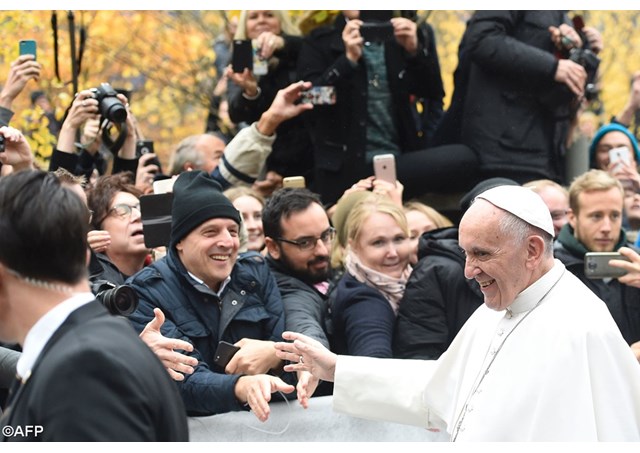
Catholics, Lutherans, stronger together to serve the world

(Vatican Radio) Pope Francis’ visit to Sweden for the joint commemoration of the Reformation comes as the culmination of 50 years of dialogue between Lutherans and Catholics, who’ll be recommitting themselves to shared witness and service.
That’s the view of the Lutheran World Federation’s Assistant General Secretary for Ecumenical Relations, Rev Dr Kaisamari Hintikka, who was closely involved in preparations for the events in the southern Swedish cities of Lund and Malmo.
The Pope and Lutheran leaders presided together on Monday at a prayer service in Lund cathedral before travelling together to a sports stadium in Malmo for a celebration of common commitment organised by the Catholic confederation Caritas Internationalis and by the Lutheran World Service.
Ahead of these historic events, Susy Hodges spoke to Rev Hintikka to find out more about the ecumenical significance of the Pope’s presence in Sweden…
Rev Hintikka says it’s an event which has been building “over 50 years of faithful and careful dialogue and theological reflection by Lutherans and Catholics”. The significance “is not just about what we do in Lund”, she says, but about the “remarkable progress we’ve been able to make”.
She notes two key ecumenical documents of the past decades, the 1999 Joint Declaration on the Doctrine of Justification, and the 2013 booklet ‘From Conflict to Communion’ in which, for the first time, Lutherans and Catholics “tell the story of the Reformation together”. We want to build on that, she says, “through a stronger joint commitment to witness to the world and service to our neighbour”.
Speaking about the location of these events in Sweden, Rev Hintikka explains that while the Reformation has its roots deep in German and north European soil, it is a global Church today and Sweden is important as the place where the LWF was founded in 1947. Lund cathedral, she continues, has both a Catholic and a Lutheran history dating back a thousand years and the joint prayer service there is an attempt to bring those histories together.
Asked about those who question why Catholics should celebrate this anniversary, Rev Hintikka says it’s important to keep in mind that while we celebrate the gifts of the Reformation, it has also been the trigger for much hatred, violence and human suffering in Europe and beyond. We need to be able to learn from that history, she says, and to concentrate on “healing of the churches, of our relationships and of the world”.
| All the contents on this site are copyrighted ©. |


